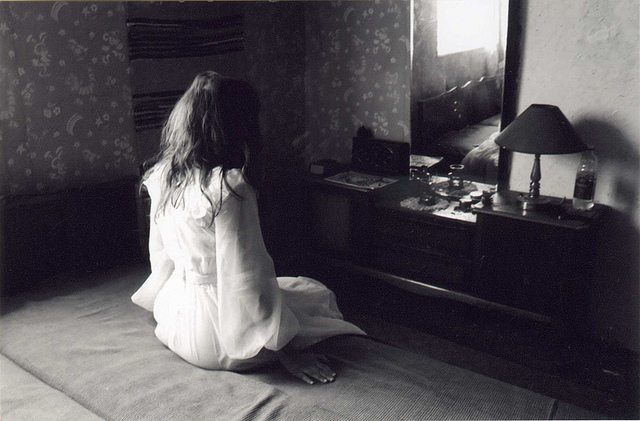“Tanned, bulbous nose, uneven and dull skin, wavy and unruly hair, fat cheeks and flabby arms.”
These are impressions I imagine other people having of me.
Truth be told, those were descriptions that came to mind when I was browsing through photos of myself.
I had an inferiority complex growing up. I always felt I wasn’t pretty or attractive enough. In fact, I truly believed I was ugly. I don’t remember when or why it all started but I guess it was a combination of things that made me feel that way.
For starters, I have a gorgeous best friend, Leanne, who was always the center of attention. She has the fairest skin, beautiful, almond shape brown eyes and lush brown hair, framing her perfect face perfectly. Anyone walking next to her would pale in comparison, fading into the background.
I, on the other hand, was a bespectacled kid. We were 12 when we went for a school camp where we slept in bunk beds and had communal bathrooms. One morning when I awoke to go to the bathroom, I was walking behind two of my schoolmates who were talking, not knowing I was there. I overheard them saying, “Leanne and Sherene look so pretty when they wake up in the morning.
But Claudine? No…” and they both shook their head and laughed.
At that moment, my heart sank and I wished I never witnessed that exchange. I never told anyone about this because I felt so ashamed of what they said and embarrassed to even confront them. I pretended as if nothing had happened when I saw them.
If they could think like that, I supposed others did too.
I do not hold them or others responsible for the way I feel about myself, and my looks. But I can’t deny that I had always allowed others’ words to affect me too much. My mother’s friends used to say to her, “You have such a smart daughter! She’s in the top girls’ school! I wish my children were as smart as her.” But that wasn’t what I wanted to hear.
I wanted them to say, “Your daughter is so pretty!” My mother, who was modest, would shrug off their praises. She never articulated her praises to me, be it about my brains or beauty. Perhaps she felt that if she did, I would become arrogant or spoilt.
When I was 15 years old, I became withdrawn and instead spent a lot of my time chatting with strangers online. I guess I felt more comfortable talking to them since I could hide my ugly appearance behind the computer screen. My parents found out and became concerned because they knew the dangers lurking in online chat rooms. They decided to have a serious talk with me.
“Why are you doing this, girl?” my father said. I broke down and confessed, “I just think I’m so ugly and I hate the way I look.”
My parents could only look at me sympathetically before my father said to me with loving eyes, “I don’t know why you think like that. You’re a beautiful girl.” I remember thinking to myself, “Of course he has to say that. He is my father.”
In my teenage years, my low self-esteem was debilitating. I was turning into a moody girl with a depressive streak who yearned for others’ admiration of my physical appearance.
I used to save my monthly allowance while I was a student and spend it on beauty products or multiple visits to the hairdresser. When I started to earn my own income, my “beauty fixes” became more frequent and also more exorbitant. Hair straightening, hair curling, hair treatment, facials, laser treatments. I felt a rush before going for one of these treatments, excited by the prospect of looking prettier and receiving compliments.
After going for several facial treatments, my beautician would say to me, “Your skin is improving!” and after a blow dry at the salon, I could anticipate the words, “Your hair looks amazing!” from my hair stylist. These made me feel happy, at least until the next beauty fix.
My derogatory self-perception had manifested itself in my interactions with others, in particular with the opposite gender. A few years ago, I was having lunch with D, my good friend. Somewhere during our amiable lunch conversation, I told him, “I hate my nose. It’s too big.”
He calmly but seriously responded, “I have actually pictured you with a sharper nose and I think that if you correct it, you’ll look drop dead gorgeous. Have you thought about going for plastic surgery?” I didn’t react at first because I must have been too shocked to say anything.
As time went by and I began to process what he had said, I got angry, disappointed and really offended.
I wanted him to say, “No your nose is perfectly fine and you look great.” I began to confide in a few of my girlfriends about D’s comment and how I felt about it. They too expressed their anger toward him, labeling him “an insensitive jerk.” These comments validated my own feelings. I felt ready to fight back and launched a tirade on him in a Facebook message, saying that he was “no better than the other superficial guys I know.”
He responded with fervent defensiveness, “If you think I’m superficial then I really have got nothing to say because it’s your choice to think what you want to think of me…in case you don’t remember, that statement which I made was in response to you saying you hate your nose …”
For weeks after that hostile exchange, we didn’t speak and I found it extremely difficult to get past what he had said and more so, his self-righteous and unrepentant attitude. In the end, he did not apologize. It was I who broke the silence by saying I was sorry for over-reacting.
But the hurt didn’t go away for a long time.
Of course, I have received a number of genuine, sincere compliments about my physical appearance but I was always skeptical: I allowed the negativity to overshadow the affirming sentiments of others, never believing that I looked good enough. For myself.
For anyone.
As a child of mixed ancestry (Portuguese, Indian and Chinese), I wanted to live up to the expectation of being beautiful—at least according to all the magazines and TV shows that extol the appearances of Pan-Asian beauties.
Unlike most “ugly duckling” stories, I do not offer a tale of transformation or metamorphosis. Instead, it is one of acceptance.
While I can now say that I do not have an obsession with looking good, it still does affect me a little. I still get upset when I gain a few pounds and I worry a little when my skin is breaking out. But it is not the end of the world. I realize that I need to be kinder to myself.
It took me about 10 years to get to this place, all thanks to the consistent love that others have shown me. My dearest family and closest friends who have seen me on my worst days with eye bags, dark eye circles, disheveled hair and no makeup. They have seen me on days when I had the flu or the morning after I had cried the night away. My nose would be runny and my eyes would swell but they didn’t care. I think about my sister who told my aunt when she was younger that “[she] wanted to be Claudine when [she] grew up.”
I think about my late father saying I’m beautiful and now I believe he really meant it. I think about beautiful Leanne who told me recently, “We actually look quite alike, like sisters from different parents.”
Most of all I think about God who loves me unconditionally, and created me perfectly. God could not have made a mistake when He created me. I could always rest in their love for me no matter how awful I looked. Love heals the broken and it continues to heal me.
I came across a quote not too long ago, which read, “You will never look good enough for someone who doesn’t love you.”
These words resonate strongly with me and I hope they strike a chord with you too. Let us remember that no matter how many beauty fixes we get to look good, it will not change the hearts and minds of people who have decided not to love us. For those who love us, beauty fixes aren’t necessary.
We will always be more than good enough.
Love elephant and want to go steady?
Sign up for our (curated) daily and weekly newsletters!
Editor: Catherine Monkman
Photo: Alenka Getman/Flickr







Read 0 comments and reply